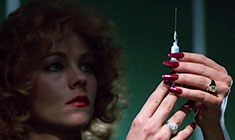|
|
|
|
Black Widow
|
 |
|
If I had to nominate the Ten Great Fiction Effects,
right up there (alongside Revenge, The Eternal Triangle, etc.) would be the mirror-rival – a theme that has returned
to haunt quite a few movies of the mid 1980s. The mirror-rival is a bit like
the doppelgänger – that duplicate
shadow of your self that keeps disappearing around corners, whom you pursue and
eventually and terrifyingly become, as
in Edgar Allan Poe’s short story “William Wilson”, R.W. Fassbinder’s Despair (1978) or Joseph Losey’s Mr Klein (1976]). The mirror-rival is
more like the psychotically violent twin, hidden away until he or she emerges
to wreak catastrophe in films like Sisters (Brian De Palma, 1973) or The Other (Robert Mulligan, 1972). But the true mirror-rival is more fundamentally disturbing
than either the dopplegänger or the twin, because he/she is actually real, and quite independent of the main
character.
The mirror-rival always appears as a reverse, negative
image of the hero – on the other side of goodness, law or normality. The hero, almost
by definition, is already somewhat elevated and estranged from society (think
of Mad Max [George Miller, 1979] or Dirty Harry [Don Siegel, 1971]), and thus sees in the hated villain
someone who is also endlessly fascinating – the only person in sight who could
ever be his or her equal or rival – and perhaps even the symbol of what the
hero most secretly longs to be.
You don’t have to go far back in film history to see
the mirror-rival at work. From just the early 1980s recall Year of the Dragon (Michael Cimino 1986 – cop Stanley White fighting it out on a bridge above the
world with Triad chief Joey Tai); Tightrope (Richard Tuggle, 1984 – Clint Eastwood as a cop watching his own kinkiness
mimicked and exaggerated by a murderous fallen cop); Once Upon A Time in America (Sergio Leone, 1984 – a man’s
treacherous best buddy steals his money, his power, his woman and indeed his
very life); and Scanners (David
Cronenberg, 1981 – supernatural Christ and Anti-Christ figures deforming and
eventually swapping each other’s bodies). The 1970s model is Sam Peckinpah’s Pat Garrett and Billy the Kid (1973) – a
growing, ever-more homo-erotic bond between hero and villain played off against
the destined moment when one must kill the other, both knowing in their hearts
that they are just sacrificial scapegoats for the rest of the normal, work-a-day world.
Come the mid 1980s, the mirror-rival can be found in a
few strange and interesting places – cross-reference with Jonathan Demme’s
great Something Wild (1986), for instance. Like in
the Old Hollywood days of A Stolen Life (Curtis Bernhardt 1946) or Johnny Guitar (Nicholas Ray 1954), we have a fine and fierce female duo (Debra Winger versus
Theresa Russell) in Bob Rafelson’s Black
Widow.
Black Widow is no knockout in
Rafelson’s career – it marks a fairly modest return to form – but it deserves
mention for the intrinsic interest of its theme. Here we have two special,
extraordinary women figures placed in mirror rivalry – both of them lacking a
key trait that the other possesses. Alex (Winger) is a brilliant,
self-appointed detective tracking down the black widow, Catharine (Russell),
who keeps changing her identity in order to marry men and then kill them for
their money (Dennis Hopper has a particularly delicious scene as a man-boy
millionaire magnate). Alex apparently lacks seductiveness (and a sex life –
note the masculine diminutive of her name); Catharine lacks compassion (and a
love life).
Rafelson, working from a good, tight script by Ronald
Bass of Rain Man (1988) fame, spins a
psychological and narrative intrigue in which these characters will somewhat
change positions through an intimate coming-into-contact – first, via a man
(ageless French hunk Sami Frey as Paul Nuytten) with whom they both have an
affair (the classic exchange token between mirror-rivals); and second, via a
direct and thrilling moment of lesbianism (it’s just a kiss, but it really
sizzles in context).
Black Widow seethes under,
rather than explodes through, its exaggeratedly cool surface-tone; but that, in
itself, is a frisson worth
experiencing.
MORE Rafelson: Blood and Wine, The King of Marvin Gardens © Adrian Martin March 1987 |
![]()